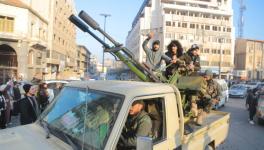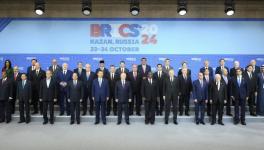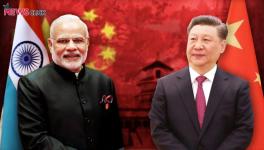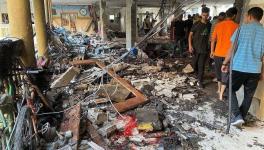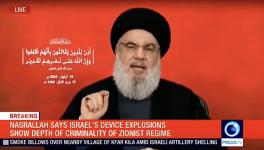Iran has a Plan for Nagorno-Karabakh
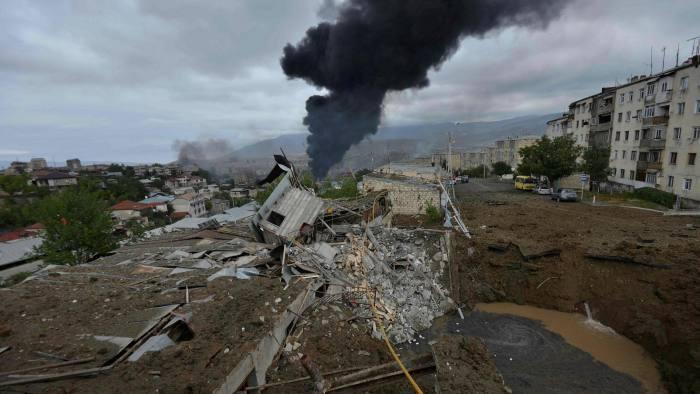
Armenian shelling on Ganja, Azerbaijan, near Iran’s border.
Iran has unveiled a regional initiative to resolve the Nagorno-Karabakh conflict. Deputy Foreign Minister Abbas Araghchi returned to Tehran in the weekend after a regional tour to Azerbaijan, Russia, Armenia and Turkey to discuss the peace plan. Foreign Minister Javad Zarif has since explained Tehran’s thinking.
A report in the Tehran Times on Sunday quoted Zarif as saying, “One of the important points of our country’s initiative is that it is not only seeking a temporary ceasefire but also a move towards resolving the conflicts based on a framework that begins with the declaration of commitment of both sides to a set of principles and then it continues with measures, especially the withdrawal of the occupying forces from all the occupied territories.”
There are some interesting elements here. First, Iran does not give credibility to the so-called Minsk Group, which has been claiming the lead role of peacemaking in the Nagorno-Karabakh conflict for the past three decades.
The Minsk Group was a progeny of the “unipolar” world order following the collapse of the former Soviet Union. Since its creation in 1992 by the Conference on Security and Cooperation in Europe [OSCE], the regional and international situation has transformed beyond recognition.
The OSCE has been increasingly acting as the West’s tool to embarrass Russia. The OSCE played a dubious role in the investigations into the alleged use of chemical weapons in the Syrian conflict. The chances Minsk Group’s “co-chairs” — the US, France and Russia — reaching a consensus on any issue are zero in the prevailing international situation.
Suffice to say, Tehran’s misgivings are well-founded. At any rate, Iran’s preference all along has been for a regional initiative and a regional solution, which is of course a principle Iran has consistently upheld over the years. As Zarif put it, “Iran believes that the countries in the region will bear the brunt of this war, and these countries can have the greatest impact on ending the war.”
Second, Iran is spot-on in its assessment that a ceasefire can only be a temporary patch-up and the core issue must be addressed, namely, the vacation of territories that are under Armenian occupation, defying the UN resolutions, and Yerevan’s seizure of even more Azeri territories.
The Iranian proposal recognises the need for a parallel effort to reach a framework to get the opposing sides to agree to commit themselves on a “set of principles” that gives primacy to “withdrawal of the occupying forces from all the occupied territories.”
To be sure, Nagorno-Karabakh should have some form of special status that safeguards “people’s rights” and communication links; also, a mechanism of regional states to monitor the implementation of such a peace package is essential.
Tehran shares Moscow’s concern regarding the presence of terrorist elements in the region. Zarif warned that Iran will not “tolerate” such a situation. As he put, the terrorist elements have not yet appeared on the Azeri border regions, “but the probability that they will be present at a distance from Iran’s borders is still high.”
What are the prospects for the Iranian plan? Iran’s initiative is driven by strong security considerations. The last thing Iran wants is a spillover of the conflict. Iran enjoys friendly relations with Armenia, Azerbaijan and Georgia, and has economic cooperation with them, especially in energy, that could get disrupted if the conflict continues.
Besides, Transcaucasia borders the Caspian, which is a highly strategic region for Iran. And Iran is deeply apprehensive that extra-regional powers hostile to it are waiting in the wings to exploit the instability.
Iran-Russia relations are close and friendly, and Tehran is keen that the two countries remain on the same page on the Nagorno-Karabakh problem. But Iran’s relationship with Turkey has also acquired a new dimension in the post-Abraham Accord situation in the Middle East.
Clearly, if anyone can persuade Armenia to see the light of reason, it is only Moscow. But for that to happen, Prime Minister Nikol Pashinyan should be made to realise that he cannot hope to play games any longer. Quite obviously, he is getting encouragement from the US. There is no question that Armenia should vacate the occupation of Azeri territory.
Iran is a natural ally for Russia over Nagorno-Karabakh, On the contrary, Turkey is behaving like a revisionist power. The US Secretary of State Mike Pompeo hit the nail on the head when he roundly condemned Turkey’s involvement in the conflict.
“We now have the Turks, who have stepped in and provided resources to Azerbaijan, increasing the risk, increasing the firepower that’s taking place in this historic fight. The resolution of that conflict ought to be done through negotiation and peaceful discussions, not through armed conflict, and certainly not with third party countries coming in to lend their firepower to what is already a powder keg of a situation,” Pompeo said on October 16.
Indeed, Washington’s problem with Turkey is not limited to Nagorno-Karabakh. Nonetheless, any attempt by Turkey to destabilise the Caucasus must be firmly countered. (Read the commentary, here, in the Turkish news agency Anadolu openly boasting that Turkish military supplies to Azerbaijan are a game changer.)
The preferred way to do it will be by addressing the longstanding Azeri grievance. Here, again, Moscow has good working relations with the leadership in Baku. Moscow also has ways and means to draw “red lines” for Turkey.
However, a disconcerting tendency lately is that Moscow tends to let things drift and takes a detached view of things even when the neighbour’s roof is on fire. On top of Ukraine and Belarus, Russia now faces the spectre of a pro-US leadership emerging in Moldova, neighbouring to Romania (which is a NATO member country.) Russia has been the main strategic partner of the incumbent Moldovan president Igor Dodon. But his pro-EU rival Maia Sandu who has cited the US as his strategic partner, secured a slender lead in the first round of election on Sunday.
Decisive action is needed from Russia’s part. Russia gets a relatively free hand as of now to galvanise a peace process, given the elections in the US and the coronavirus pandemic in Europe. But this window of opportunity won’t last long.
Too many extra-regional players are rolling up the sleeves to intervene and make Nagorno-Karabakh another geopolitical slugfest on Russia’s southern borders. Symptomatic of this is the reported remark by the US National Security Adviser Robert O’Brien that Turkey should play no role in a peacekeeping force in Nagorno-Karabakh and that he was working with Scandinavian governments to put together a potential peacekeeping mission. O’Brien didn’t consider it worthwhile to consult Moscow!
Suffice to say, Iran’s initiative needs to be followed up urgently. The conflict in Nagorno-Karabakh is now in its sixth week. Attacks continue on residential and civilian areas with missile strikes. The UN’s High Commissioner for Human Rights Michelle Bachelet said Monday that “reports that cluster munitions have been used by both parties” were “deeply troubling.” Bachelet warned that such attacks “may amount to war crimes.”
Get the latest reports & analysis with people's perspective on Protests, movements & deep analytical videos, discussions of the current affairs in your Telegram app. Subscribe to NewsClick's Telegram channel & get Real-Time updates on stories, as they get published on our website.










